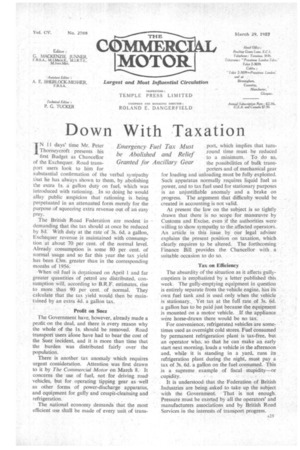Down With Taxation
Page 27

If you've noticed an error in this article please click here to report it so we can fix it.
IN 11 days' time Mr. Peter Thorneycroft presents his first Budget as Chancellor of the Exchequer. Road transport users look to him for substantial. confirmation of the verbal synipathy that he has always shown to them, by abolishing the extra is. a gallon duty on fuel, which was introduced with rationing. In so doing he would allay public suspicion that rationing is being perpetuated in an attenuated form merely for the purpose of squeezing extra revenue out of an easy prey.
The British Road Federation are modest • in demanding that the tax should at once be reduced by 8d. With duty at the rate of 3s. 6d. a gallon, Exchequer .revenue is maintained with consumption at about 70 per cent, of the normal level. Already consumption is some 80 per cent. of normal usage and so far this year the tax yield has been Om, greater than in the corresponding months of 1956. • -When oil fuel is derationed. on April 1 and far greater quantities. of petrol are distributed, consumption will, according to B.R.F. estimates, rise to more than 90 per cent, of normal. They calculate that the tax yield would then be maintained by an extra 4d. a gallon tax Profit on Suez .
The Government have, however, already made a profit on the deal, and there is .every reason why the whole of the Is, should be removed. Road transport users alone have had to bear the cost of the Suez incident, and it is more than time that the burden was distributed fairly over the population.
There is another tax anomaly which requires urgent consideration. Attention was first drawn to it by The Commercial Motor On March 8. It concerns the use of fuel; not for driving road vehicles, but for operating 'tipping gear as: well as other forms of power-discharge apparatus, and equipment for gully and cesspit-cleansing and refrigeration.
• The national economy demands. that the most efficient use shall be made of every unit of trans port, which implies that turnround time must be reduced to a minimum. To do so, the possibilities of bulk transporters and of mechanical gear for loading and unloading must be fully exploited. Such apparatus normally requires liquid fuel as power, and to tax fuel used for stationary purposes is an unjustifiable anomaly and a brake on progress. The argument that difficulty would be created in accounting is not valid.
At present the law on the subject is so tightly drawn that there is no scope for manceuvre by Customs and Excise, even if the authorities were willing to show sympathy to the affected operators. An article in this issue by our legal adviser explains the present position on taxation, which clearly requires to be altered. The forthcoming Finance Bill. provides the Chancellor with a suitable occasion to do so.
Tax on Efficiency The absurdity of the situation as it affects gullyemptiers is emphasized by a letter published this week. The gully-emptying equipment in question is entirely separate from the vehicle engine, has its own fuel tank and is used only when the vehicle is stationary.. Yet tax at the full rate of 3s. 6d. a gallon has to be paid just because the equipment is mounted on a motor vehicle. If the appliance were horse-drawn there would be no tax.
For convenience, refrigerated vehicles are sometimes used as overnight cold stores. Fuel consumed by permanent refrigeration plant is' tax-free, but an operator who, so that he can make an early start next morning, loads a vehicle in the afternoon and, while it is standing in a yard, runs its refrigeration plant during the night, must pay a tax of 3s. 6d. a gallon on the fuel consumed. This is a supreme example of fiscal stupidity—or cupidity.
It is understood that the Federation of British Industries are being asked to take up the subject with the Government. That is not enough. Pressure must be exerted by all the operators' and manufacturers associations and by British Road Services in the interests of transport progress.




























































































